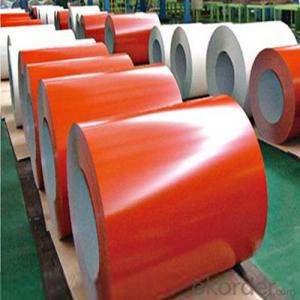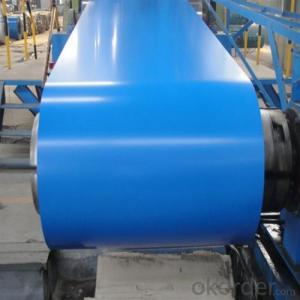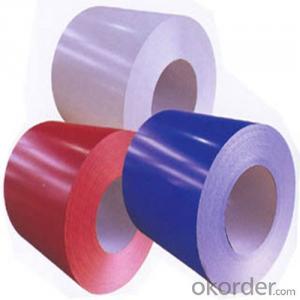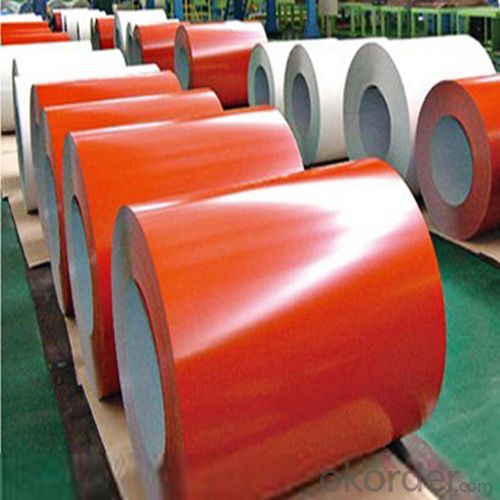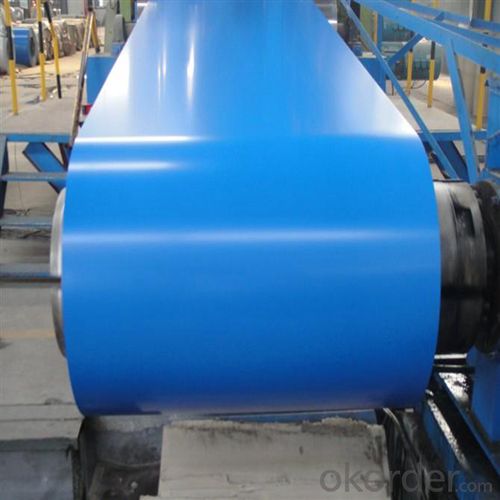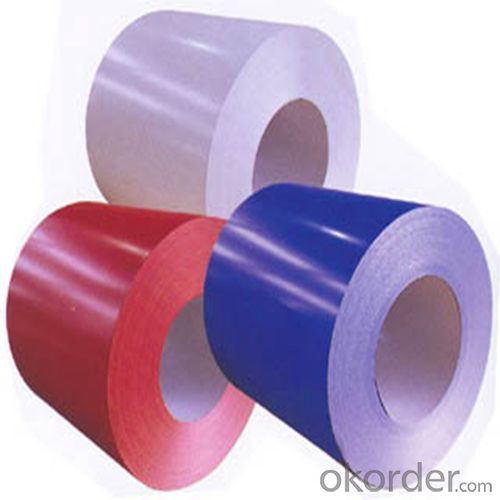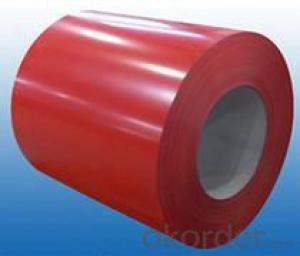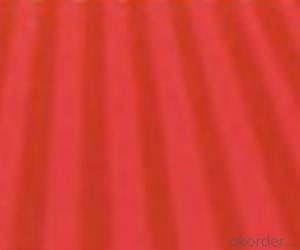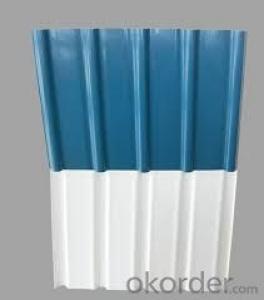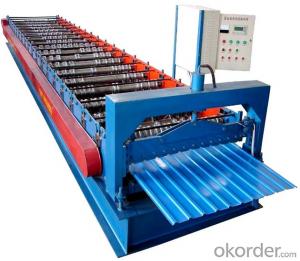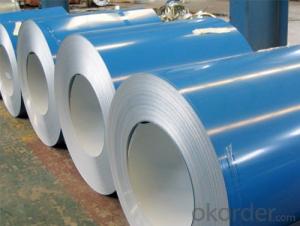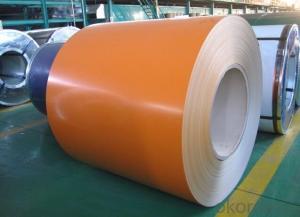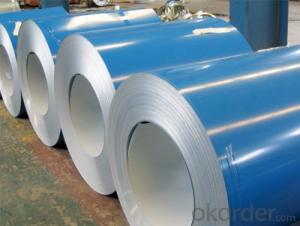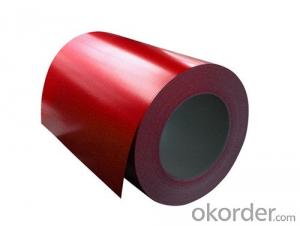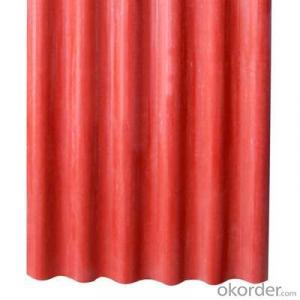Pre-painted Galvanized Steel Coil for Good Price
- Loading Port:
- Tianjin
- Payment Terms:
- TT OR LC
- Min Order Qty:
- 100 m.t.
- Supply Capability:
- 5000 m.t./month
OKorder Service Pledge
OKorder Financial Service
You Might Also Like
1. Defination of Prepainted Galvanized Steel Coil
Pre-painted coils are produced by coating a layer of paint on the surface of cold rolled, galvanized or galvalumed coils. Aesthetic appeal and durability are the key festures of color coated steel coil. A wide selection of colors is available to the customer and paints designed to meet specific end use could be specified.
2. Applications of Prepainted Galvanized SteelCoil
1) Buildings and constructions: roofing, ceilings, gutters, venting lines, indoor decorations, window frames, etc.
2) Electrical appliances: computer shells, washing machines, refrigerators, dehumidifiers, video recorders, water heaters, etc.
3) Agricultural equipments: troughs, feeding tools, agricultural driers, irrigation channels, etc.
4) Vehicle parts: back-seat plates of buses and trucks, conveying systems, oil tanks, etc.
3. Specifications of Prepainted Galvanized SteelCoil
Standard: ASTM;ASTM;JIS;GB
Grade: SGCC;(DX51D)
Thickness: 0.12-1.2mm
Width: 750-1250mm
Length: Coil or customer's requirements
Zinc Coating: 60-140g/m2
Painting : Top side from 15-25um; Bottom side from 5-10 um
Color : RAL numbers or customers' sample color
Application: building trade, electric apparatus, furniture and transport service
Production arts and crafts : Double coated double drying
Coil ID: 508mm
Coil Weight: 3-6 Ton
Type :coil
Packaging Detail: Fully seaworthy export packing with paper tube or as per customer's requirements
4. Prepainted Galvanized Steel Coil Images
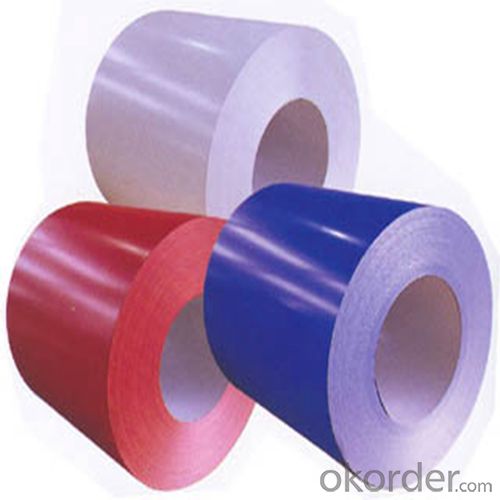
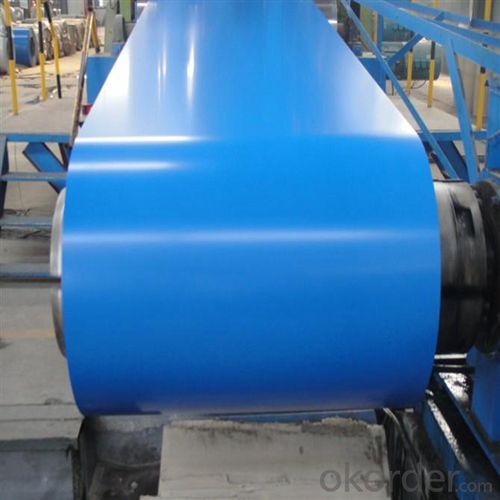
5. Advantages of Our Prepainted Galvanized SteelCoil
1) Excellent corrosion resistance: The zinc layer provides a good protection of Pre-painted Galvanizeed Steel Sheet.
2) High heat resistance: The reflective surface of the material aids in efficiently reflecting the sunlight away and in turn reducing the amount of heat transmitted. The thermal reflectivity converts into energy savings.
3) Aesthetics: Pre-Painted Galvanized steel sheet is available in plethora of patterns and multiple sizes as per the requirements that given by our customers.
4) Versatility: can be used in the various areas.
6. FAQ
We have organized several common questions for our clients,may help you sincerely:
1) How about your company?
A world class manufacturer & supplier of castings forging in carbon steel and alloy steel,is one of the large-scale professional investment casting production bases in China,consisting of both casting foundry forging and machining factory. Annually more than 8000 tons Precision casting and forging parts are exported to markets in Europe,America and Japan. OEM casting and forging service available according to customer’s requirements.
2) How to guarantee the quality of the products?
We have established the international advanced quality management system,every link from raw material to final product we have strict quality test;We resolutely put an end to unqualified products flowing into the market. At the same time, we will provide necessary follow-up service assurance.
3) How long can we receive the product after purchase?
In the purchase of product within three working days, We will arrange the factory delivery as soon as possible. The pecific time of receiving is related to the state and position of customers.Commonly 7 to 10 working days can be served.
- Q: What is the difference between cold rolling and hot rolling?
- Hot rolling and cold rolling are forming processes of profiled steel or sheet steel. They have a great influence on the microstructure and properties of steels. Steel is rolled mainly by hot rolling, and cold rolled only for the manufacture of small sections of steel and thin plates. I. advantages of hot rolling: it can destroy the casting structure of steel ingot, refine the grain of steel, and eliminate the defects of microstructure, so that the steel structure is compact and the mechanical properties are improved. This improvement is mainly in the direction of rolling, so that the steel is no longer isotropic to a certain extent;
- Q: Can steel sheets be used in architectural applications?
- Yes, steel sheets can be used in architectural applications. Steel is a versatile material that offers strength, durability, and design flexibility, making it suitable for various architectural purposes such as roofing, cladding, structural framing, and decorative elements. Steel sheets can be shaped, formed, and customized to meet specific architectural requirements, making them a popular choice in modern construction projects.
- Q: What are the common thicknesses available for steel sheets?
- The common thicknesses available for steel sheets typically range from 0.5 mm to 25 mm, depending on the specific application and industry requirements.
- Q: What is the difference between a standard and high-strength steel sheet?
- The mechanical properties and performance characteristics distinguish standard steel sheets from high-strength steel sheets. Standard sheets are typically made from low to medium carbon steel, having a yield strength of approximately 250 MPa. These sheets are commonly utilized in applications that do not require extreme strength or resistance to deformation. In contrast, high-strength steel sheets contain a higher carbon content and alloying elements like manganese, chromium, or nickel. This composition empowers them with significantly higher yield strengths, ranging from 350 to over 1,000 MPa. Consequently, high-strength steel sheets offer improved resistance to deformation, higher tensile strength, and enhanced durability. Given their superior mechanical properties, high-strength steel sheets are often chosen for applications that necessitate heightened strength-to-weight ratios, such as automotive components, structural parts, and heavy machinery. These sheets can withstand greater loads, endure extreme conditions, and provide superior protection in the event of impact or sudden forces. While standard steel sheets are more readily available and less costly, high-strength steel sheets are preferable in situations where exceptional strength and performance are imperative. However, it is important to note that high-strength steel sheets may present challenges in terms of forming, welding, or machining due to their increased hardness. Therefore, careful consideration of the specific application requirements is vital when deciding between standard and high-strength steel sheets.
- Q: Are the steel sheets suitable for structural applications?
- Steel sheets are an excellent choice for structural applications, given their outstanding strength and durability. They are highly suitable for constructing buildings, bridges, and other structures that necessitate stability and support. With their remarkable tensile strength and capacity to bear heavy loads, steel sheets offer structural integrity and can endure diverse environmental conditions, such as earthquakes, hurricanes, and extreme temperatures. Moreover, steel sheets are easily fabricated and molded to meet precise design specifications, providing flexibility and versatility in structural applications.
- Q: Can steel sheets be used for radiation shielding?
- Yes, steel sheets can be used for radiation shielding. Steel is a commonly used material for radiation shielding due to its high density and ability to absorb and scatter radiation. When it comes to protecting against radiation, the thickness of the shield is crucial. Thicker steel sheets are more effective in blocking radiation, as they have a higher absorption capacity. Steel sheets can be utilized for various applications such as in nuclear power plants, medical facilities, industrial radiography, and even in the construction of protective barriers in areas with high levels of radiation.
- Q: How do steel sheets perform in terms of air permeability?
- Steel sheets are not permeable to air, meaning they do not allow air to pass through them easily.
- Q: Are the steel sheets resistant to oil or grease?
- Yes, steel sheets are generally resistant to oil or grease. Steel is known for its durability and resistance to various chemicals, including oil and grease. The smooth surface of steel sheets makes it difficult for substances like oil or grease to adhere to them, allowing for easy cleaning and maintenance. Additionally, steel sheets can be further treated or coated with protective materials to enhance their resistance to oil or grease if required.
- Q: How do you store steel sheets to prevent damage?
- To prevent damage to steel sheets, it is important to store them in a dry and well-ventilated area to avoid moisture buildup. Sheets should be stored horizontally on a flat surface, ideally on pallets or racks, to prevent bending or warping. It is crucial to keep them away from direct contact with the ground or any other surfaces that could cause scratches or dents. Additionally, using separators or interleaving materials between each sheet can help prevent surface damage.
- Q: What are the different grades of steel used for manufacturing sheets?
- There are several different grades of steel used for manufacturing sheets, each with specific properties and applications. Some of the commonly used grades include: 1. Mild Steel (also known as low carbon steel): This is the most widely used grade of steel for manufacturing sheets. It has a low carbon content, making it easy to work with and relatively inexpensive. Mild steel sheets are used in a variety of applications, such as construction, automotive manufacturing, and general fabrication. 2. High-strength Low-alloy (HSLA) Steel: This grade of steel provides higher strength and improved corrosion resistance compared to mild steel. HSLA steel sheets are commonly used in heavy machinery, transportation equipment, and structural applications where strength is critical. 3. Galvanized Steel: Galvanized steel sheets are coated with a layer of zinc, which provides excellent corrosion resistance. These sheets are commonly used in outdoor applications, such as roofing, siding, and automotive parts. 4. Stainless Steel: Stainless steel sheets are highly resistant to corrosion and staining, making them suitable for a wide range of applications. They are commonly used in food processing equipment, medical devices, and architectural components. 5. Tool Steel: Tool steel sheets are specifically designed to have high hardness, wear resistance, and toughness. They are used for manufacturing cutting tools, dies, and molds. These are just a few examples of the different grades of steel used for manufacturing sheets. The choice of grade depends on the specific requirements of the application, such as strength, corrosion resistance, and cost.
Send your message to us
Pre-painted Galvanized Steel Coil for Good Price
- Loading Port:
- Tianjin
- Payment Terms:
- TT OR LC
- Min Order Qty:
- 100 m.t.
- Supply Capability:
- 5000 m.t./month
OKorder Service Pledge
OKorder Financial Service
Similar products
Hot products
Hot Searches
Related keywords
